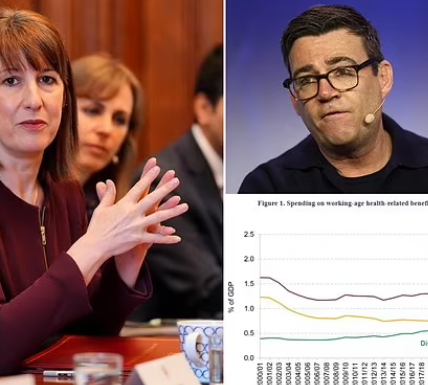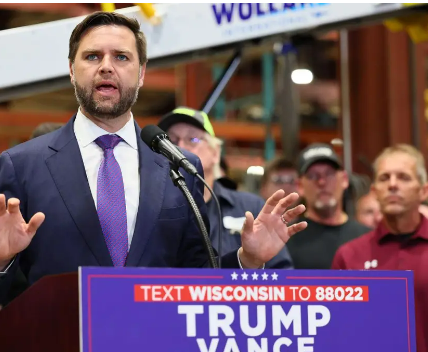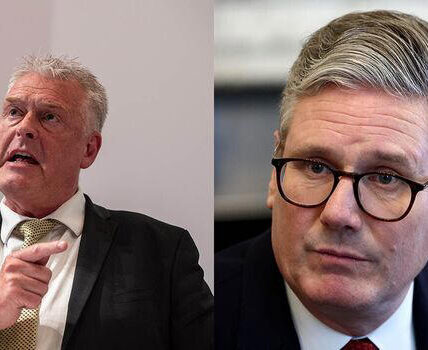But Sean McGuire, CBI director for Europe and international, said: ‘We welcome the UK Government’s commitment to take meaningful action to ”reset” the EU-UK relationship. The Chancellor’s meeting with EU Finance Ministers is an important milestone on this journey as both of our economies face shared geopolitical, security, economic and climate challenges.
‘Further action on regulatory co-operation, progress on mutual recognition across different areas, and a reduction in customs and administrative burdens are just some of the areas of focus that can boost business confidence and make the most of our trading relationship with the EU.
‘By putting in the diplomatic ”hard yards” now, the government can start the process for unlocking the untapped potential of our trading relationship with the EU as part of its focus for delivering sustainable growth.’
Ms Reeves told reporters in Brussels: ‘Economic growth is not a zero-sum game.
‘Countries right across Europe, inside and outside the European Union, including the UK, have struggled with low growth, poor productivity and stagnant living standards these last few years.
‘Competitiveness and trade, crucially, are really important for driving productivity and growth.
‘And so, as we reset our relations, it is with the purpose of growing our economy and improving living standards for ordinary working people.’
German finance minister Jorg Kukies said it was a ‘good signal’ that the Chancellor was visiting Brussels, but suggested there were limits to what could be achieved within the Government’s red lines of not rejoining the single market or customs union.
He said: ‘It’s a good signal that there is this dialogue now and that there are these ideas.
‘But of course, the new British Government has made commitments to the British electorate and I don’t think it would be appropriate for us to call those into question, because those are part of the electoral platform on which it was elected.’
Asked if he wanted to be as ambitious as possible on lowering trade barriers, Mr Kukies said: ‘Germany is a very open country to trade, and we’ve seen that the intensity of trade with the United Kingdom has gone down quite substantially, if I measure it against our trade partners in the world.
‘We used to do a lot more on relative basis with United Kingdom than we are doing now, and we are very actively looking to diversify our trade partners and to do more in terms of trade.
‘So, of course, any progress would be highly welcome, but we completely understand that the UK population has taken a different decision. And we have to respect that.’
Ireland’s Jack Chambers said Ms Reeves’ presence at the meeting of eurozone finance ministers marked the ‘turning of a new leaf’ in UK-EU relations.
He said it was ‘an important day in terms of wider EU-UK reset of relations’, adding: ‘I think the fact that, as a starting point, the British Government wants to have such an engagement compared to what was there in the previous number of years, where we had a very different type of language from the British Government, is welcome.’
Ministers fear that a US-inspired trade war could wreck the government’s hopes for boosting economic growth in the coming years.
Sir Keir Starmer has put the idea of an EU reset at the top of his diplomatic priorities during his first months as Prime Minister, holding private talks with a string of EU leaders.
But he has given little clue publicly about what trade offs he is willing to accept in return for Brussels removing some of the economic barriers imposed in the wake of the UK’s departure from the EU.
Privately, EU diplomats complain that ministers have also been coy with them about exactly what the PM is seeking. And there is frustration in Brussels at the UK’s failure to embrace proposals for a ‘youth mobility scheme’ which would allow young people from across the EU to live and work in the UK for a set period.
A diplomatic source said it would be ‘tough’ for the UK to get any significant concessions on trade unless it gives ground on the youth mobility issue.
A Treasury source said the Chancellor would also make the case for the UK and the EU to join forces in ‘championing free trade’ against a potentially protectionist White House administration (file photo)
But ministers fear the scheme would be seen as Labour bringing back a form of free movement. And Home Secretary Yvette Cooper has warned it would add to net migration figures at a time when they are already at near-record levels.
Labour’s manifesto pledged a new veterinary agreement to reduce barriers to trade in food, along with a push for greater mutual recognition of professional qualifications.
But Brexiteers fear this would involve the UK aligning itself with EU rules and accepting a role for the European Court of Justice in settling disputes.
Lib Dem deputy leader Daisy Cooper urged ministers to move further and faster in cosying up to Brussels, saying ‘warm words’ were not enough.
‘The Government needs to be more ambitious about rebuilding stronger ties with our European allies,’ she said.
‘It’s difficult to understand why they are failing to pursue the UK-EU Youth Mobility Scheme, which would be a good first step, provide a boost to the economy and give young people opportunities to live and work across Europe.’
Shadow business secretary Andrew Griffith urged the Chancellor to focus on reversing her ‘devastating Budget measures’.
He added: ‘If she is interested in growth, she should tell the Prime Minister to jump on a plane to the US and talk to Trump about getting a US-UK trade deal done, not trying to take Britain backwards into the slow growth EU.’







